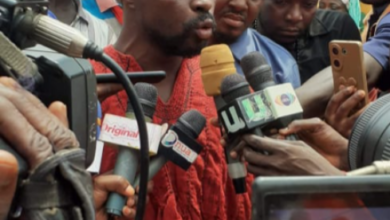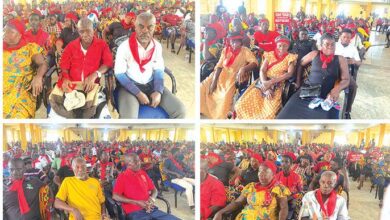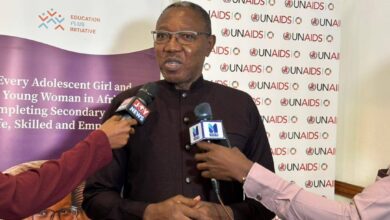Goldbod Doesn’t Buy Gold From Illegal Miners
…Sammy Gyamfi Crushes Kofi Bentil’s Endless Propaganda

The Chief Executive Officer of the Ghana Gold Board (GoldBod), Mr. Sammy Gyamfi, has dismissed claims by Vice President of IMANI Africa, Mr. Kofi Bentil, suggesting that the government agency buys gold from illegal miners, commonly known as “galamsey” operators.
Mr. Bentil, speaking on TV3’s news analysis programme ‘The Key Points’ on Saturday, October 11, alleged that as much as 85% of the gold purchased by GoldBod originates from illegal mining sources.
Citing research data, he accused the government of not being serious about fighting the galamsey menace.
“We continue to buy gold from illegal miners who constitute 85% of small-scale miners, and yet we claim we are fighting galamsey,” Mr. Bentil argued.
He also criticised the government’s style of tackling the problem, saying, “When I declined to attend the President’s meeting with civil society organisations, I posted my suggestions on Facebook. One, is that we should dismiss all DCEs whose areas have galamsey taking place. If I don’t see DCEs being sacked, I will not believe President Mahama is serious about fighting galamsey.”
Swift Rebuttal
In a swift rebuttal, Mr. Sammy Gyamfi called into the live programme to set the record straight. He stated categorically that the Ghana Gold Board does not engage with illegal miners.
“GoldBod does not buy gold from illegal miners. We only deal with licensed small-scale miners, and even then, we do not buy gold directly from them. We operate through licensed aggregators and agents,” he explained.
While acknowledging the possibility that some agents may unknowingly source gold from unlicensed miners, Mr. Gyamfi assured the public that steps are being taken to introduce a gold traceability system to ensure the integrity of gold purchases.
“We are in the process of implementing a traceability scheme that will ensure GoldBod purchases gold only from legitimate sources,” he added.
Minister for Government Communications, Mr. Felix Kwakye Ofosu, also defended the government’s stance, stating there is no policy supporting the purchase of gold from galamsey operators.
“There is no government policy to purchase gold from illegal miners. If for nothing at all, the international community is very interested in the source of our gold,” Mr. Ofosu stressed.
National Traceability Starts 2026
Meanwhile, GoldBod is set to deploy an unprecedented national track-and-trace system for all gold purchases by the first quarter of 2026 (Q1 2026).
Mr. Gyamfi announced the ambitious deadline during interview on TV3’s “Key Points” programme confirming that the directive was personally issued by President John Dramani Mahama.
The new system is the central element of the agency’s strategy to ensure total compliance with its legal mandate—to buy gold solely from licensed sources.
This requirement is enshrined in Section 31X of the Gold Board Act (Act 1140), which was passed by Parliament in 2025.
The CEO highlighted the transformative nature of the upcoming technology.
“We have given timelines that by the first quarter of next year, we will have a track-and-trace system, which has never happened since Ghana became Ghana. This system will allow us to trace every gram of gold produced in Ghana and purchased by the Gold Board to its source,” Mr. Gyamfi stated.
The technology is specifically designed to overcome the critical monitoring gap currently exploited by illicit operators.
Mr. Gyamfi acknowledged that GoldBod currently faces a severe challenge in regulating its more than 700 licensed gold buyers operating in district and regional capitals across Ghana.
“We know that there are over 700 licensed buyers of the Gold Board across the length and breadth of Ghana. Some of them may at some point be doing the wrong thing,” Mr. Gyamfi conceded.
He explained the technical difficulty for agents operating away from the mine sites: “Gold is bought in offices in district and regional capitals, not directly from mining sites. So, when a buyer in Koforidua receives gold nuggets or powder, that person may not have the technology to confirm whether the seller is licensed.”
Despite the alleged compliance issues within the network, GoldBod maintains a significant role in the formal sector. The agency’s gold sources break down as follows:
- Large-Scale Mining: 20 per cent of GoldBod’s total purchases come from seven major large-scale mining companies.
- Small-Scale Mining: The remaining 80 per cent is sourced from over 2,000 licensed small-scale miners nationwide, funneled through the Gold Board’s 700+ licensed buying agents.
The new track-and-trace system is aimed squarely at eliminating fraud within the small-scale category, where the gold is often difficult to distinguish from illegal sources.
The CEO asserted that the technology would eliminate the possibility of human error and regulatory weakness, which he noted is not unique to Ghana.
Mr. Gyamfi also used the opportunity to counter political critiques, defending the administration’s current oversight while noting that GoldBod actively supports the Minerals Commission with financial and logistical support for anti-galamsey operations.
The Board confirmed that its licensing terms are transparently available on its website and explicitly prohibit dealings with illegal miners.



